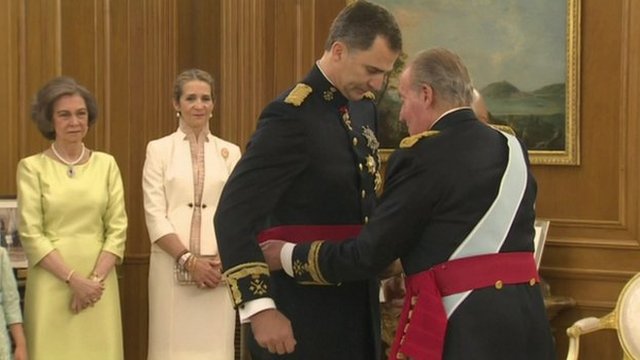
Felipe VI is the new king of Spain. Juan Carlos’s son legally took over as the country’s new monarch at midnight when the abdication law signed on Wednesday came into force.
The low-key ceremony to proclaim Felipe king began at 9.30am on Thursday, when Juan Carlos presented him with the sash of the commander-in chief of the armed forces, a position held by the head of state as per the Spanish Constitution.
After the ceremonial act at La Zarzuela palace, the royal residence, father and son embraced each other and the new monarch greeted his wife, Queen Letizia, and his daughters Leonor, the new Princess of Asturias, and Sofía.
At 10am, a motorcade left the palace for Congress, in downtown Madrid, where the actual coronation ceremony was to take place in recognition of the fact that Spain is a constitutional monarchy.
Amid heavy security measures, a black Rolls-Royce took the new monarchs and their daughters to the lower house of parliament, where 325 deputies, 259 senators and other elected officials awaited them.
The new royals arrived at Congress three minutes before 10.30am, where they stood on a red dais to listen to a live rendition of the Spanish national anthem before moving inside the building. Felipe VI stood at attention with Queen Letizia standing to his left and their two young daughters to his right.
Felipe VI then inspected the troops standing in formation on the Carrera de San Jerónimo. Afterwards, the royal family walked up the steps to cries of “Felipe! Felipe!” from the crowd gathered outside Congress and waving Spanish flags. A standing ovation awaited them inside the lower house, after which Congress speaker Jesús Posadas delivered a speech.
Posadas had words of gratitude for the 39 years of service given by Juan Carlos’ wife, Queen Sofía, who held back tears as she received a standing ovation of her own while her eldest daughter Elena stood by her side.
Juan Carlos had chosen not to be in Congress so as not to take the focus away from his son.
There was no actual crowning per se – no Spanish monarch has used a crown since the days of the Catholic monarchs – but rather a solemn proclamation. At 10.47am, a serious-looking Felipe VI took his oath, Posadas proclaimed him king, and Congress cried out “Viva el rey! Viva España!” as the national anthem was played again.
Felipe then took to the stand to deliver his first speech as Spain’s new king, describing his reign as “a renewed monarchy for new times.”
Speaking about the unity but also the plurality of Spain, in recognition of regions where separatist sentiment is high such as Catalonia and the Basque Country, the king underscored his respect for the Constitution and said that “the reign of a constitutional king is now getting underway.”
Felipe VI went on to express his desire to become a symbol of national unity. “The parliamentary monarchy can and must continue to provide a fundamental service [to the nation],” he said.
Since his father Juan Carlos announced his abdication earlier this month, there have been strong displays of republican sentiment in many Spanish cities, including Madrid.
“The Crown must constantly earn citizens’ appreciation, respect and trust,” Felipe said.
Spain’s new king also acknowledged the economic crisis and the widespread disaffection for politicians. “Today, more than ever, citizens are rightly demanding that public officials lead by example,” he said.
Calling for a renewed spirit of governance based on the best interest of Spaniards, Felipe VI said “today I would like for us to look forward to the future.”
King Felipe ended his speech with a quote from Don Quixote: “A man is not worth more than another man if he does not do more than him” and hoped that Spaniards would feel proud of his own day-to-day work. He then thanked his audience in Castilian Spanish, Catalan, Basque and Galician.